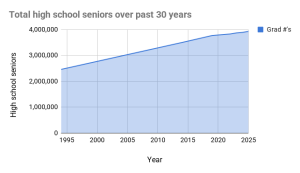Social media poses threat to mental health
New generational connections to social media give way to new mental health risks
March 6, 2017
Health teachers and students recognize that the use of social media, a seemingly frivolous form of entertainment, could have dangerous consequences, reaping more negative effects than positive on one’s mental health.
Health Teacher Jennifer Tricoli uses social media to promote and reinforce positive messages to her students. However, she acknowledges its repercussions. “Some studies show it worsens your attention span, interferes with your ability to comprehend things, and worsens your ability to learn new concepts. Teens are more susceptible to these consequences,” Tricoli said.
Furthermore, Erika’s Lighthouse Executive Director Heather Freed said, “A lot of the stressors that would come up in sessions with young people were about what was said or done on social media. Sometimes it was a catalyst for problems in relationships, self-esteem and anxiety.”
In a 2002 study, Harvard Medical student Anne Becker studied Fiji women over a 20-year period. Until around 1995, people in Fiji had little to no exposure to social media and television and had very few cases of eating disorders. However, once introduced to this technology, she found that the women displayed alarming rates of eating disorders, demonstrating social media’s affect on body image perception.
Additionally, social media can contribute to cyber bullying. “It enables kids to not face their peers when they are in an argument or something uncomfortable socially where they can hide behind a screen,” Health Teacher Laura Deutsch said.
“It desensitizes people from realizing the impact it has on other people. It reinforces the non-realistic world. If you are not old enough to have established what the real world really is, you’re going to get your information from the world that’s false.”
Social media can also distort people’s perception of their peers. “It makes it easier for people to compare one another. It often showcases only the positive aspects of peoples’ lives,” Freed said.
Deutsch elaborated on this perspective. “It skews reality. You’re basing your popularity or your likability or your acceptance on likes and dislikes and people’s reactions. Your perception of reality is based in a virtual world,” she said.
Similarly, junior JoJo Farina relates to this as he tends to post more “superficial” aspects of his life. “You aren’t going to post something too personal on your Instagram. People normally post happy or exciting or funny things, but it only gives a one-sided perspective of people’s lives,” he said.
“As users of social media we have control of the image we want to portray. We can post pictures that we think look the most flattering, we can decide to share the experiences and images that are the most fun and exciting,” Freed said.
“We tend not to post the mundane and painful parts of our lives. I think it can affect perception by making people feel like everyone else’s lives are awesome and theirs isn’t.”
However, junior Galen Quinn doesn’t believe this fake perception has the same negative impact. “Most people strive to make their social media accounts match their ideal situation when their realities are different,” he said.
“People do this as a way of empowering themselves. It’s human nature to feel good about yourself if other people appreciate you and social media is a conduit for people to be appreciated.”
Whether negative or positive, social media’s effect is amplified due to its accessibility and its invasiveness in our lives.
“Young adults usually look at their home as a safe haven from possible bullying, being left out or just gossip,” Dr. Dianne Stone, New Trier’s school psychologist, said. “Social media has no boundaries and can enter your personal space wherever you may be.”
In terms of evading the negative affects of social media, “the first step is following people who you find inspiring, happy, and hopeful so that your feed is full of positive influences. It shouldn’t be something you’re glued to 24 hours a day,” Freed said.
Tricoli believes parents need to have more control. “There is an appropriate time to talk about limits and what’s appropriate and what’s over the line. Teens don’t know where the line is anymore,” she said.
Regardless of people’s opinions on social media, Freed said, “It’s also a platform where negativity and hate can breathe and live and grow. The power is in the intention of the user.”











































